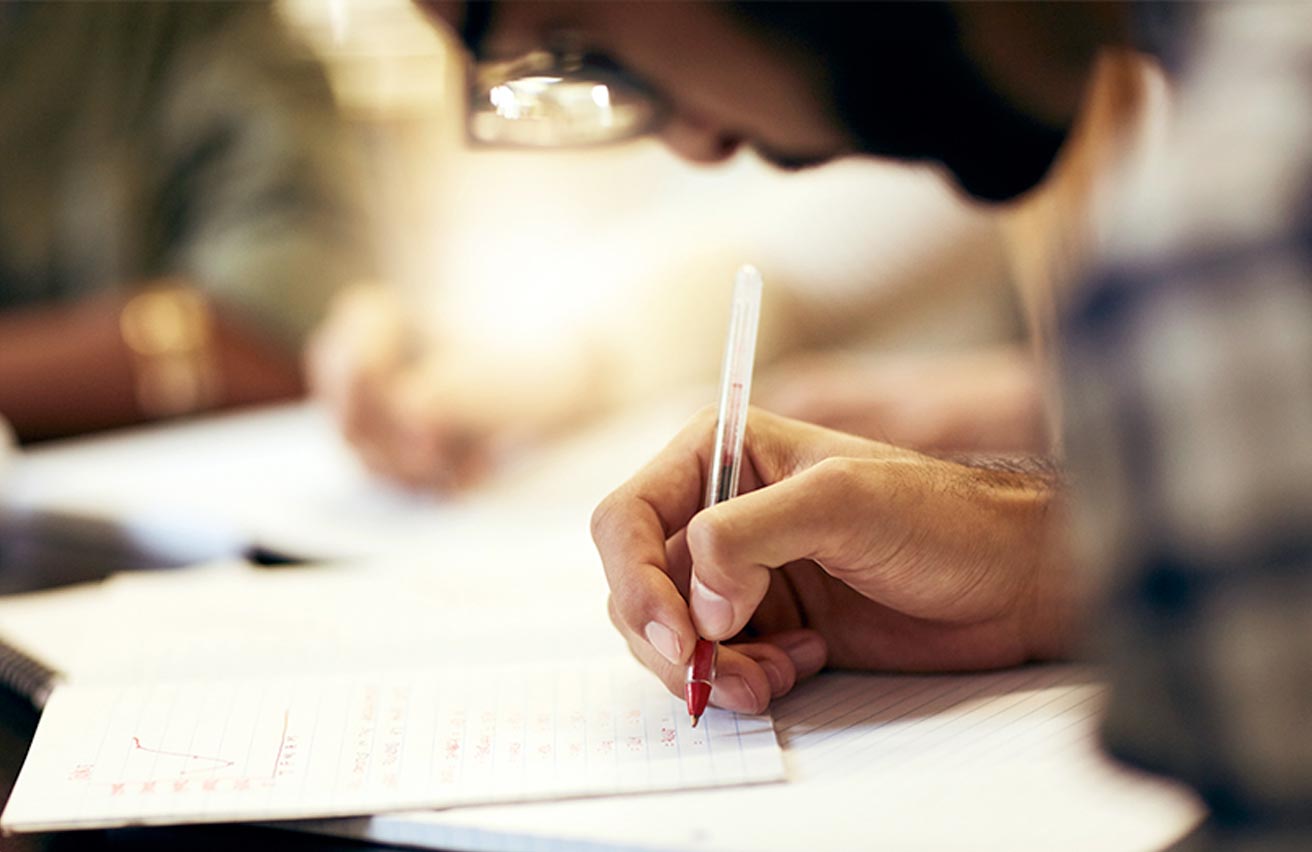There are several reasons why examinations make us anxious. We wrestle with our own expectations and those of others. We worry that the information in our head won’t translate into the grades we deserve. We wince about the impact on our future if we get things wrong on exam day.
The truth? Your ability to learn is a skill you’ll need for the rest of your life. So, while your next examination might seem like the be-all and end-all, it’s the development of a learning process – which suits your individual character – that really matters. Find a learning process that works for you, and your grades will take care of themselves.
We’ve put together 10 tips to help you do this.
1 | Practise on past exam papers
You know that using mock or past exam papers is a critical tool when preparing for exams. But when you plan to take them is equally important. A common mistake is to wait until right before exam time to test yourself using an old test paper. The danger of this last-minute approach is that if you score lower than you expected, it’ll knock your confidence. And there won’t be time to recover before the main event.
So, make sure you take the mock exams early on, leaving yourself enough time to address any areas of weakness before the final exam. However, for the purposes of exam preparation, it’s important to take another mock paper closer to the big day to get a feel for the pace at which you’ll need to work – make sure you time your effort.

2 | Take regular breaks and get some exercise
As your eyes open for another day of study, and you picture the mountain of work you need to get through, it’s easy to feel overwhelmed. But there are a few hacks you can use to manage that feeling. Among them, exercise is all-powerful.
By exercising first thing in the morning, you’ll overcome an invisible force that can undermine a productive study session – it’s called inertia. That feeling of post-workout achievement, bolstered by the wonderful cocktail of chemicals that physical exertion releases into your bloodstream, is so pleasant that you crave more of it throughout the day. And how else can you keep achieving? A solid day of exam preparation under the belt, well, it’s a virtuous cycle. (Note: you should do whatever form of exercise you’re most comfortable with – no need to tackle dangerous single track on a mountain bike if you like brisk walking.)
3 | Use mind maps to unleash your brain’s creativity and potential
A very small percentage of people can read over their exam material once or twice and fully comprehend and retain the necessary information. Most of us need to wrangle with the study materials in a more tangible manner to make them stick. Mnemonics is the practice of making up a word or rhyme where each letter stands for a piece of information you need to remember. Trying to memorise the colours of the rainbow? Use the name Roy G. Biv (red, orange, yellow, green, blue, indigo and violet.)
Equally useful is creating a visual representation, or mind map, of the material you need to study. This will help not only with your study material retention, but also with your understanding of the connections, relationships, and hierarchies that exist between the subject matter.
4 | Give concise answers
Except for multiple-choice exams, your test results will depend largely on how the person marking your paper interprets your answers. Now, given that they are vulnerable to errors of judgement (because they’re human), that your exam will be one of many they need to mark, and that they might be tired when they sit down to grade your paper, it’s important that you answer the questions concisely.

The temptation in any exam is to spill as much information onto the page as possible in the hope that somewhere you’ll cover what the question was asking for. But if you ramble, the grader might interpret that as a lack of understanding and mark you down accordingly. Make sure you read the questions carefully and give the marker only what they need – they’ll likely reward you for it.
5 | Organise study groups
One of the best ways to learn is to teach. It sounds a bit counterintuitive at first, but you can only really teach something once you understand it. Herein lies the power of a study group. Getting together with others provides participants with an opportunity to test their understanding of the relevant material.

In talking through difficult topics, you’ll be able to solidify the knowledge, through teaching, in the areas where you’re confident. And for your areas of weakness, you can ask someone else to teach it to you. Group study is a symbiotic practice where all members stand to gain. They can also be useful in helping you manage your stress levels; it always helps to know there are others in your boat.
6 | Exams are getting even closer, give yourself enough time to study
We’ve all done it, spent the small hours cramming in the lead up to exam day. But enough neurological studies have warned on the ineffectiveness of cramming while simultaneously stressing the importance of getting enough sleep when it comes to information retention. We know we shouldn’t be substituting the latter for the former. But getting enough sleep isn’t always easy during exam time – exercising, writing down bothersome thoughts, avoiding caffein after lunch, and going to bed at a similar hour each night can all help you fall, and stay, asleep.

The type of sleep you get is also important. Slumbering for your full 7 to 9 hours is important because REM sleep – the kind of shut-eye that helps you consolidate memories and make neural connections – is backend loaded; the longest period of REM sleep usually happens in the last hour or two before you wake.
Of course, the key to taking advantage of this powerful learning aid is effective time management so that cramming isn’t necessary. Plan your studies. Leave yourself enough time.
7 | Leverage the power of routine
If you’ve ever tried to get running fit, you’ll know that the first kilometer borders on torture. Your lungs burn, your brain melts into a useless goo, and the temptation to turn around and stagger home is, well, demanding. It’s the same when you first sit down to begin preparing for exams.

The trick to overcoming your initial resistance to the activity, as is the case with running, is to get through the first study session and then find a rhythm, a routine, so you don’t have to go through that initial pain again. Try to be consistent with the days and times that you put aside for studying, be disciplined, and it’ll get easier and easier to put in the hours you need to be successful.
8 | Find your productivity sweet spot
Being mindful has many benefits. In the context of studying for an exam, it means noticing when you are at your most productive. Focus on identifying the combination of factors that puts you into a state of flow where learning becomes easy and enjoyable.
Notice where you like to learn. It may be in a dark corner with a solitary lamp providing an illuminating sense of focus. Maybe it’s a coffee shop, decorated with natural wood, humming with ambient noise. Or perhaps you like studying outdoors. In addition to the where, figure out when learning comes easiest for you. Lastly, be aware of what form of study materials you learn from best, be it audio, video, or plain old text – then see if you can weight your learning toward your preferred medium.
9 | Organise your study space and minimise distractions
It can take up to 30 minutes to refocus on a task after being interrupted, according to The Muse website. And today, we face a constant barrage of distraction. Perhaps the most obvious is the (insidious) pull of social media. Remember that your brain will naturally protest during study time; it would rather be doing things that require less cognitive energy – it’s why we get hungry or tired even though we’ve just eaten or slept.
And it’s so much easier to pick up your phone and get lost in a Facebook feed than it is to work on your mind maps or flashcards.
Put your cellphone in another room when you sit down to study. If you’re working off a computer, disable your Wi-Fi until you’ve done the amount of studying you had planned. Then, make sure you also have something to drink and snack on, so that the fridge doesn’t beckon you.

It’s recommended that you focus on one topic/subject per study session – aim for 90 minutes and then have a break – rather than switching between unrelated fields during each session; your brain will treat the latter approach as an interruption.
10 | Keep it personal
This is not the first or last study tips article to be written. And you probably already knew that these approaches are what’s required to do well in an exam.
If you’re overwhelmed by the thought of studying, use the points raised above as framework, rather than gospel, and put in the effort to find out what works for you – it’s the type of knowledge that’ll stand you in good stead well past your next exam.
Additional source: The Muse.com

